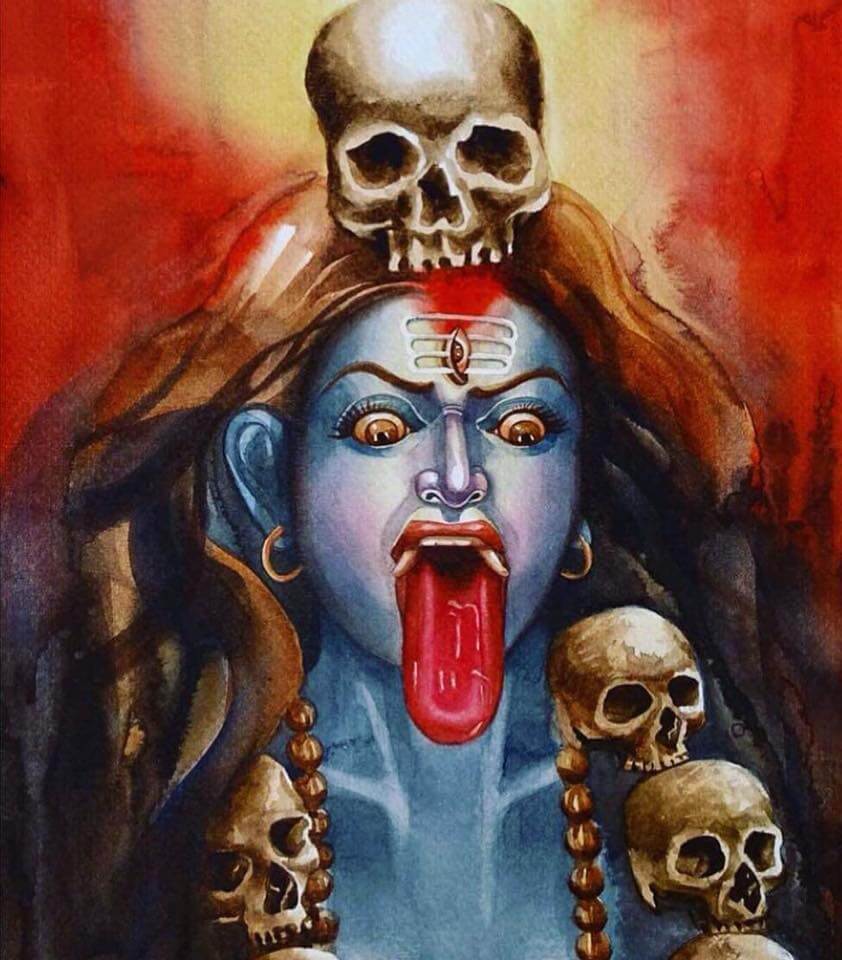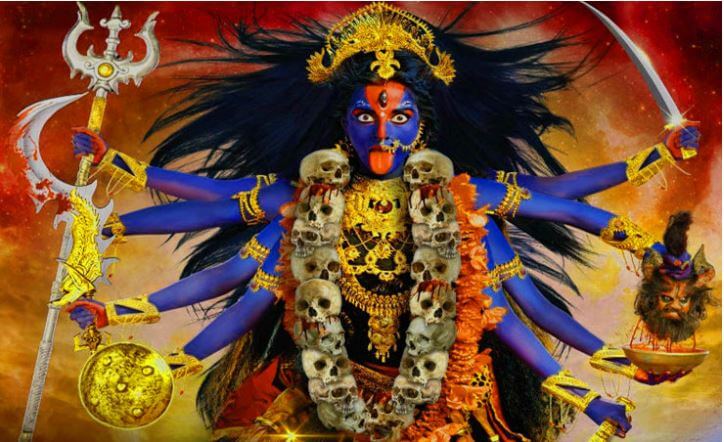
The seventh day of Navratri is dedicated to the worship of Goddess Kalratri, who is a fierce and terrifying form of Goddess Parvati. She is believed to be the destroyer of darkness and ignorance. Goddess Kalratri is also associated with the night and is said to be the embodiment of darkness and death. She is believed to be a compassionate goddess who can bless her devotees with boons and fulfil their wishes.
Goddess Kalratri is understood to have been born from the forehead of Goddess Durga. She was created to destroy two demons named Shumbha and Nishumbha. She is also said to have destroyed the demon Raktabija, who had the power to multiply himself every time a drop of his blood fell on the ground.
It is a popular belief worshipping Goddess Kalratri can help devotees overcome fear, negativity, and darkness in their lives, and gain strength, courage, and protection.
Goddess Kalratri is also known as Kali, which means black or dark and is often depicted with a dark complexion, dishevelled hair, and four arms. One of her arms is raised in a gesture of blessing, while the other holds a sword, a trident, and a noose.
She is adorned with a garland of skulls and multiple arms holding weapons and is often shown riding a donkey or a horse, which symbolizes her ability to overcome obstacles and challenges.
Navaratri Day 7: Significance
According to Hindu mythology, Goddess Kalratri is the seventh form of Goddess Durga and is worshipped during the festival of Navratri.

In some parts of India, particularly in the northern state of Punjab, the seventh day of Navratri is celebrated as Durga Ashtami or Maha Ashtami, which marks the day when Goddess Durga is believed to have defeated the demon Mahishasura. Devotees perform elaborate rituals and celebrations to honour Goddess Durga and seek her blessings on this day.
Colour
There is no specific mention of Goddess Kalratri’s favourite colour in Hindu scriptures or mythology. However, since she is associated with darkness and strength, black is often considered her preferred colour. Black symbolizes power, protection, and the ability to overcome obstacles, which are all attributes associated with Goddess Kalratri.
Puja Vidhi:
The seventh day of Navaratri is known as Maha Saptami and is considered an important day of the festival. The word “saptami” means seventh, and it is believed that on this day, the Goddess Durga or her nine forms arrived on earth to destroy evil forces.
There are several significant rituals and traditions associated with Maha Saptami, such as the Navapatrika Puja, which involves worshipping nine plants representing the nine forms of Goddess Durga. Another important ritual is the Saptami Homa or fire ceremony, which is performed to seek the blessings of Goddess Durga for strength and protection.
In some regions of India, the seventh day of Navaratri is also celebrated as Saraswati Puja, dedicated to the Goddess of knowledge, music, and the arts. Students and scholars worship Saraswati on this day, seeking her blessings for success in their studies and careers.
Overall, the seventh day of Navaratri symbolizes the triumph of good over evil and the importance of seeking the blessings of the divine for strength and protection.
On the seventh day of Navratri, devotees offer prayers and perform puja to Goddess Kalratri, often using black or blue flowers and clothes as offerings. They may also recite mantras and hymns dedicated to the goddess, and some may observe fasts as a way of seeking her blessings.
Bhog:
Offerings or “bhog” plays an important role in the worship of Goddess Kalratri.
The most common offering made to Goddess Kalratri is “naivedya,” which is a food offering made to the deity. Devotees prepare various vegetarian dishes such as rice, lentils, vegetables, fruits, sweets, and other delicacies as a part of the bhog.
Devotees offer foods with high nutritional value and energy, such as sesame seeds, jaggery, and dry fruits. Some devotees also offer meat and alcohol as part of bhog.
The exact nature of the bhog offered to Goddess Kalratri may vary depending on regional customs and personal beliefs. However, the key aspect is to offer the bhog with devotion and purity of heart, seeking her blessings for strength, courage, and protection.
Favourite Flower
Night blooming jasmine (रात की रानी)
Mantra
ॐ देवी कालरात्र्यै नमः॥
Om Devi Kalaratryai Namah॥
Hail Devi Kalratri
Prarthana
एकवेणी जपाकर्णपूरा नग्ना खरास्थिता।
लम्बोष्ठी कर्णिकाकर्णी तैलाभ्यक्त शरीरिणी॥
वामपादोल्लसल्लोह लताकण्टकभूषणा।
वर्धन मूर्धध्वजा कृष्णा कालरात्रिर्भयङ्करी॥
Ekaveni Japakarnapura Nagna Kharasthita।
Lamboshthi Karnikakarni Tailabhyakta Sharirini॥
Vamapadollasalloha Latakantakabhushana।
Vardhana Murdhadhwaja Krishna Kalaratrirbhayankari॥
She who is seated on a lion, who destroys fearsome enemies with one hand and blesses with the other, who is adorned with a garland of severed heads, who is naked and resides in a solitary place where jackals howl, whose lips are long and hanging and whose body is anointed with oil, who wears a serpent as a garland, whose left foot is pressing on the demon Mahishasura, who has a complexion as dark as the night, and whose banner depicts the emblem of a boar – to that fierce and terrifying form of Goddess Durga, I bow down with reverence.
This prayer invokes Goddess Kalratri and acknowledges her as the divine force that resides within all beings. It is believed that by reciting this prayer with devotion and sincerity, one can seek her blessings for strength, courage, and protection from all kinds of negative influences and obstacles. In addition to this prayer, there are several other mantras and stotras dedicated to Goddess Kalratri that can be recited during Navaratri or any other time for seeking her blessings and protection.
Stuti
या देवी सर्वभूतेषु माँ कालरात्रि रूपेण संस्थिता। नमस्तस्यै नमस्तस्यै नमस्तस्यै नमो नमः॥
Ya Devi Sarvabhuteshu Ma Kalaratri Rupena Samsthita।
Namastasyai Namastasyai Namastasyai Namo Namah॥
Salutations to the goddess who is present in all beings as the form of Kalaratri. I bow down to her, again and again
Dhyana
करालवन्दना घोरां मुक्तकेशी चतुर्भुजाम्।
कालरात्रिम् करालिंका दिव्याम् विद्युतमाला विभूषिताम्॥
दिव्यम् लौहवज्र खड्ग वामोघोर्ध्व कराम्बुजाम्।
अभयम् वरदाम् चैव दक्षिणोध्वाघः पार्णिकाम् मम्॥
महामेघ प्रभाम् श्यामाम् तक्षा चैव गर्दभारूढ़ा।
घोरदंश कारालास्यां पीनोन्नत पयोधराम्॥
सुख पप्रसन्न वदना स्मेरान्न सरोरूहाम्।
एवम् सचियन्तयेत् कालरात्रिम् सर्वकाम् समृध्दिदाम्॥
Karalavandana Ghoram Muktakeshi Chaturbhujam।
Kalaratrim Karalimka Divyam Vidyutamala Vibhushitam॥
Divyam Lauhavajra Khadga Vamoghordhva Karambujam।
Abhayam Varadam Chaiva Dakshinodhvaghah Parnikam Mam॥
Mahamegha Prabham Shyamam Taksha Chaiva Gardabharudha।
Ghoradamsha Karalasyam Pinonnata Payodharam॥
Sukha Prasanna Vadana Smeranna Saroruham।
Evam Sachiyantayet Kalaratrim Sarvakam Samriddhidam॥
I bow down to the fearsome goddess Kalaratri, who has wild hair, and four arms, and is adorned with a garland of lightning. She holds divine weapons such as the sword, the thunderbolt, and the iron club. Her right-hand grants fearlessness and blessings, while her left-hand holds a noose. She rides a donkey and has the radiance of a great black cloud. Her teeth are fierce and terrifying, and she has a prominent belly. She has a pleasant and serene face, and her lotus-like eyes are filled with a gentle smile. By meditating on Kalaratri in this way, all desires are fulfilled and abundance is bestowed.
Stotra
हीं कालरात्रि श्रीं कराली च क्लीं कल्याणी कलावती।
कालमाता कलिदर्पध्नी कमदीश कुपान्विता॥
कामबीजजपान्दा कमबीजस्वरूपिणी।
कुमतिघ्नी कुलीनर्तिनाशिनी कुल कामिनी॥
क्लीं ह्रीं श्रीं मन्त्र्वर्णेन कालकण्टकघातिनी।
कृपामयी कृपाधारा कृपापारा कृपागमा॥
Him Kalaratri Shrim Karali Cha Klim Kalyani Kalawati।
Kalamata Kalidarpadhni Kamadisha Kupanvita॥
Kamabijajapanda Kamabijaswarupini।
Kumatighni Kulinartinashini Kula Kamini॥
Klim Hrim Shrim Mantrvarnena Kalakantakaghatini।
Kripamayi Kripadhara Kripapara Kripagama॥
I offer my salutations to Kalaratri, who is fearsome, to Karali who has dishevelled hair and four arms, to Kalyani who is auspicious, to Kalavati who is adorned with a garland of lightning, to Kalamata who destroys the pride of the enemy, to Kalidarpadnhi who is the destroyer of time, to Kamadisha who is the ruler of desire and to Kupanvit who is the one who protects.
I offer my salutations to the one who is the seed of desire and who chants that seed, who is the embodiment of that seed, who destroys impure thoughts, who eliminates the suffering of the noble, and who fulfils the desires of the lineage.
I offer my salutations to the one who destroys the thorns of time with the mantra syllables Klim, Hrim, and Shrim, who is merciful, who is the bearer of mercy, who is the supreme mercy, and who is the source of mercy.
Kavacha
ऊँ क्लीं मे हृदयम् पातु पादौ श्रीकालरात्रि।
ललाटे सततम् पातु तुष्टग्रह निवारिणी॥
रसनाम् पातु कौमारी, भैरवी चक्षुषोर्भम।
कटौ पृष्ठे महेशानी, कर्णोशङ्करभामिनी॥
वर्जितानी तु स्थानाभि यानि च कवचेन हि।
तानि सर्वाणि मे देवीसततंपातु स्तम्भिनी॥
Om Klim Me Hridayam Patu Padau Shrikalaratri।
Lalate Satatam Patu Tushtagraha Nivarini॥
Rasanam Patu Kaumari, Bhairavi Chakshushorbhama।
Katau Prishthe Maheshani, Karnoshankarabhamini॥
Varjitani Tu Sthanabhi Yani Cha Kavachena Hi।
Tani Sarvani Me Devisatatampatu Stambhini॥
Om, may the goddess Kalaratri protect my heart with the sound ‘Kleem’. May she always protect my feet, and remove the obstacles caused by malefic planets from my forehead.
May the goddess Kaumari protect my tongue, and the goddess Bhairavi protect my eyes. May the goddess Maheshani protect my back, and the goddess Shankarabhamini protect my ears.
May all the places that are not protected by the armor be covered by the goddess, and may she always be my support and protector
Aarti
कालरात्रि जय जय महाकाली। काल के मुंह से बचाने वाली॥
दुष्ट संघारक नाम तुम्हारा। महाचंडी तेरा अवतारा॥
पृथ्वी और आकाश पे सारा। महाकाली है तेरा पसारा॥
खड्ग खप्पर रखने वाली। दुष्टों का लहू चखने वाली॥
कलकत्ता स्थान तुम्हारा। सब जगह देखूं तेरा नजारा॥
सभी देवता सब नर-नारी। गावें स्तुति सभी तुम्हारी॥
रक्तदन्ता और अन्नपूर्णा। कृपा करे तो कोई भी दुःख ना॥
ना कोई चिंता रहे ना बीमारी। ना कोई गम ना संकट भारी॥
उस पर कभी कष्ट ना आवे। महाकाली माँ जिसे बचावे॥
तू भी भक्त प्रेम से कह। कालरात्रि माँ तेरी जय॥
Victory, victory to Kali, the great mother of time, who saves us from the mouth of death.
Your name destroys the wicked. You are the great Chandi’s incarnation.
You spread your power over the earth and sky, O Mahakali.
You hold the sword and shield and taste the blood of the wicked.
Kolkata is your abode, and we see you everywhere.
All gods and humans sing your praises.
You are the one with bloody teeth and the provider of food.
Grant your grace so that no one suffers or feels pain.
No one should worry or be afflicted with disease or sorrow.
Let no difficulties ever trouble them. The one whom Mother Kali protects.
With love and devotion, say, ‘Victory to you, Kali Ma!’

